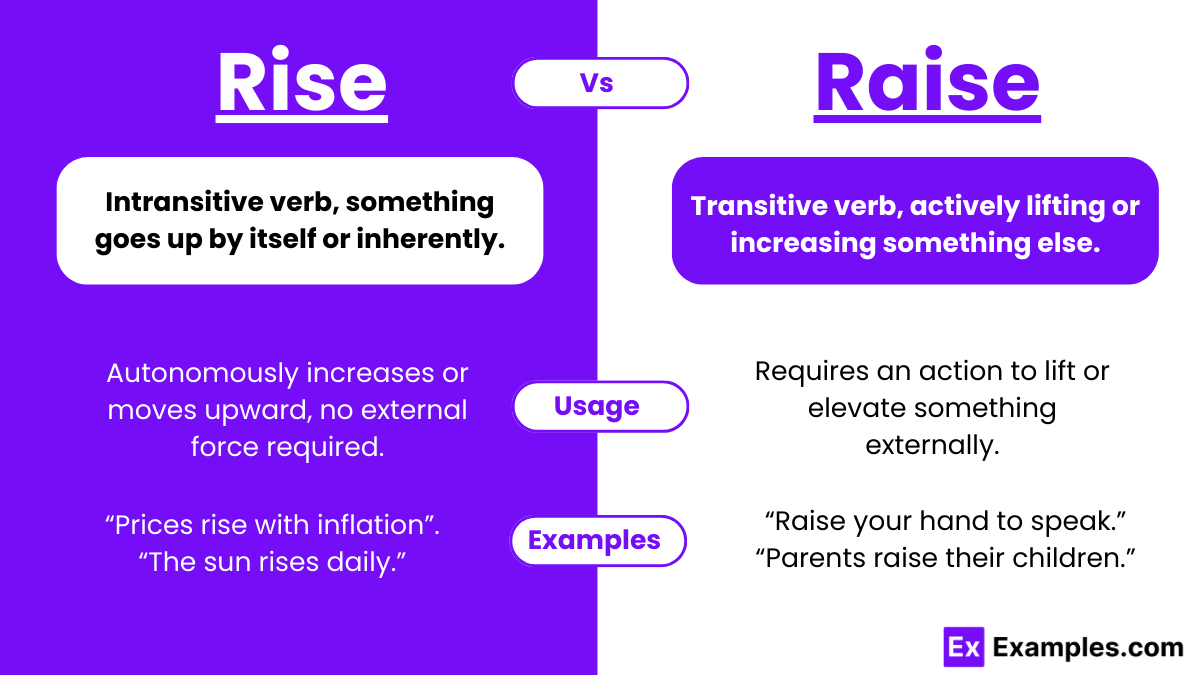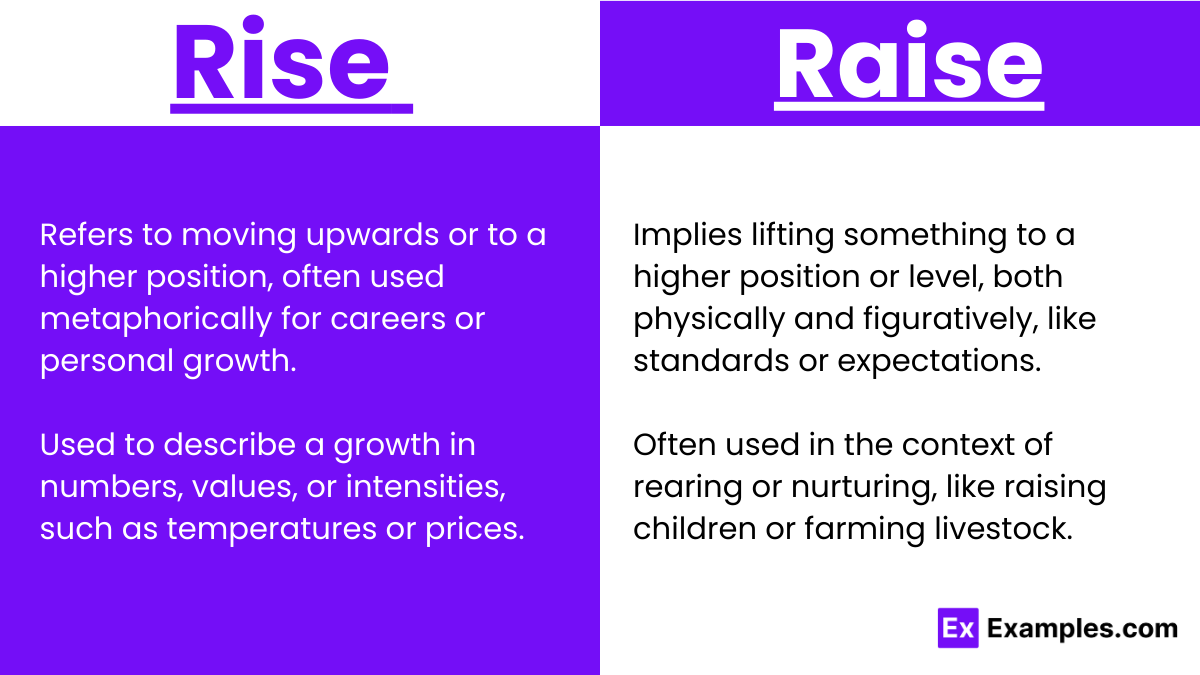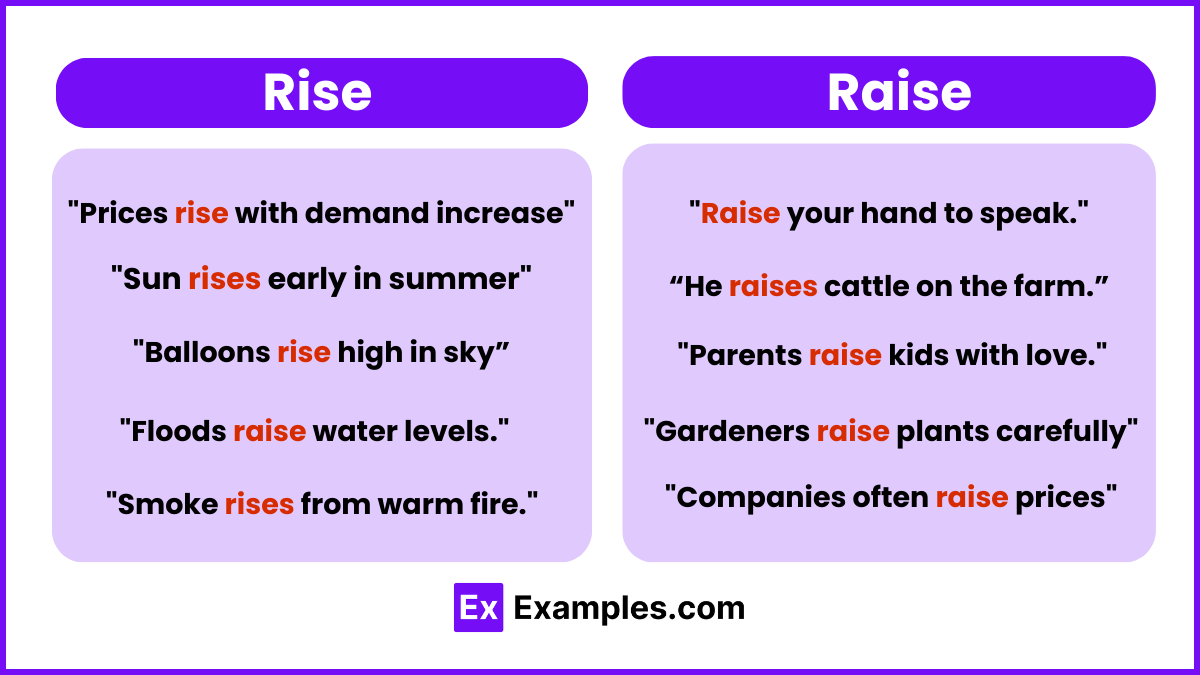Rise vs Raise – Examples, Differences, Usage, Tricks
Embark on a linguistic journey to decipher two of English’s most commonly confused verbs: “rise” and “raise.” This exploration is not just about definitions; it’s a deep dive into understanding their subtle differences, practical uses, and how they fit into the fabric of language. Tailored for students, this article promises clarity, enriching insights, and a solid foundation to elevate your grammar prowess. Let’s demystify “rise” and “raise,” and discover their unique roles in English.
“Rise and Raise” – Meanings
Rise: The verb “rise” refers to an upward movement or an increase that occurs autonomously, without the direct intervention of an external force. It is an intransitive verb, meaning it does not require an object to complete its action. “Rise” can describe the sun ascending in the sky, an individual standing up, or a gradual increase in quantity or intensity, such as prices, temperatures, or levels. It encapsulates the essence of self-driven or natural elevation or growth, whether it be physical, numerical, or metaphorical, embodying a sense of ascent or escalation from a lower to a higher state.
Raise: Contrarily, “raise” is a transitive verb that necessitates the presence of an object to receive the action. It signifies the act of moving something upwards or increasing something in amount or degree through deliberate effort. “Raise” can apply to physical actions, such as lifting an object higher, or abstract concepts, such as raising awareness or standards. It involves an intentional or forced elevation, often implying an external intervention or effort exerted to uplift, enhance, or promote something. Whether it’s elevating a flag, boosting a voice, or augmenting funds, “raise” conveys a direct, purposeful action impacting an object or cause.
Summary
Understanding “rise” and “raise” illuminates their distinct grammatical roles and practical applications in English. “Rise” is intransitive, used when the subject itself ascends or increases without direct external assistance, reflecting autonomous or natural actions like the sun rising or a person standing up. “Raise,” however, is transitive, necessitating an object that receives the action, as in raising a hand or increasing a value. Mastery of these verbs enhances expression, aiding students in navigating complex linguistic landscapes with precision.
How To Pronounce Rise and Raise
How To Pronounce “Rise”:
The word “rise” is pronounced as /raɪz/, with a long “i” sound similar to “eye” and a soft “z” sound as in “zoo.” The pronunciation emphasizes a smooth, continuous sound, starting with the rhotic ‘r’ sound, moving into the long ‘i’, and ending with the ‘z’ sound. It’s essential to blend these sounds seamlessly to accurately convey the word. This pronunciation is consistent across various English dialects, making “rise” a straightforward word to articulate, regardless of the speaker’s native accent.
How To Pronounce “Raise”:
“Raise” is pronounced as /reɪz/, featuring a long “a” sound that echoes the word “lay,” followed by a soft “z” sound similar to “zebra.” The word starts with a slightly rolled ‘r’ sound, leading into the long ‘a’, and concluding with the ‘z’ sound. The key to pronouncing “raise” correctly lies in stretching the ‘a’ to ensure it sounds more like “ray” than “raz.” This pronunciation rule applies universally, ensuring clarity and understanding when the word is used in conversation.
Difference Between Rise and Raise
| Aspect | Rise | Raise |
|---|---|---|
| Verb Type | Intransitive | Transitive |
| Requirement | No object required | Object required |
| Action | Autonomous or natural increase | Caused by an external force |
| Examples | Sun rises, prices rise | Raise your hand, raise prices |
| Use Case | Describing self-rising actions | Elevating something else |
| Grammatical Role | Subject does action on itself | Subject acts on an object |
| Forms | Rise, rose, risen | Raise, raised, raised |
| Common Associations | Sun, dough, smoke | Hands, salaries, awareness |
| Pronunciation | /raɪz/ | /reɪz/ |
| Nature of Increase | Passive | Active |
Tricks to Remember Rise and Raise
- “Rise” is what you do; “Raise” is what you do to something.
- No object after “rise“; always an object after “raise.”
- Think “sunrise” for “rise“; think “raise your hand” for “raise.”
- “Rise” for natural actions; “Raise” when effort is applied.
- “Rise” in the morning by yourself; “Raise” the blinds manually.
- Use “rise” for autonomous increases; use “raise” for intentional ones.
- “Risen” from bed but “raised” the alarm.
- “Rise” like dough; “raise” the stakes.
- Birds “rise” early; farmers “raise” crops.
- Prices “rise” on their own; salaries are “raised” by someone
When to Use Rise and Raise
When to Use Rise:
- When standing up from sitting.
- When the sun comes up.
- When prices go up naturally.
- When waking up in the morning.
- When smoke goes up into the air.
When to Use Raise:
- When lifting something higher.
- When increasing salary or prices intentionally.
- When elevating a flag or banner.
- When bringing up children.
- When boosting a signal.
How to Use Rise and Raise
How to Use Rise:
- Stand up from a seated position.
- Attend early after waking up.
- Accept challenges with courage.
- Expect prices to increase.
- Observe the sun ascend in the morning.
How to Use Raise:
- Elevate your hand to answer.
- Uplift others with your words.
- Increment your voice for awareness.
- Heighten the volume of music.
- Promote employees for their hard work.
Rise and Raise Examples
Rise Examples:
- Temperatures rise in July.
- Balloons rise into the sky.
- The hero rises after defeat.
- Smoke rises from the chimney.
- Tensions rise in the room.
Raise Examples:
- Raise the flag every morning.
- She raises her glass to toast.
- Companies often raise prices.
- He raises cattle on the farm.
- Parents raise their children with care.
Synonyms For Rise and Raise
| Rise | Raise |
|---|---|
| Ascend | Elevate |
| Climb | Lift |
| Increase | Enhance |
| Soar | Boost |
| Surge | Amplify |
| Elevate | Hoist |
| Mount | Uplift |
| Escalate | Heighten |
| Swell | Build |
| Grow | Upgrade |
Fill in the blank with the correct form of “Rise and Raise”:
- The sun ___ early in the summer.
- Could you ___ the window for some fresh air?
- The dough needs to ___ for about an hour.
- Please ___ your hand if you have a question.
- Interest rates ___ due to inflation.
- They plan to ___ awareness through social media.
- The athlete hoped to ___ above the competition.
- The charity aims to ___ funds for the homeless.
- With each step, they ___ higher up the mountain.
- She ___ her voice against injustice.
Answers
(Rises)
(Raise)
(Rise)
(Raise)
(Rise)
(Raise)
(Rise)
(Raise)
(Rose)
(Raised)
What is the main difference between “rise” and “raise”?
“Rise” is an intransitive verb meaning something goes up by itself, whereas “raise” is a transitive verb requiring an object, meaning someone or something makes it go up.
Can “rise” and “raise” be used interchangeably?
No, they cannot. “Rise” is used for actions that happen on their own, like the sun rising, while “raise” is used when an action is performed on something else, like raising a hand.
How do I remember when to use “rise” vs “raise”?
Think of “rise” as something happening by itself (no direct object), and “raise” as needing an agent to lift or elevate something else (requires an object)
How can I practice using “rise” and “raise” correctly?
Practice by creating sentences or identifying actions around you that involve upward movement. Determine if the action happens on its own or requires an agent.
“Rise” and “Raise” serve distinct but equally vital roles in English, describing upward movements or increases in different contexts. “Rise” reflects an autonomous or natural action, whereas “raise” involves an external force acting upon an object or concept. Mastering the use of these verbs enriches language proficiency, allowing for precise and nuanced expression. This guide illuminates their differences, fostering a deeper understanding and correct application in daily language.




